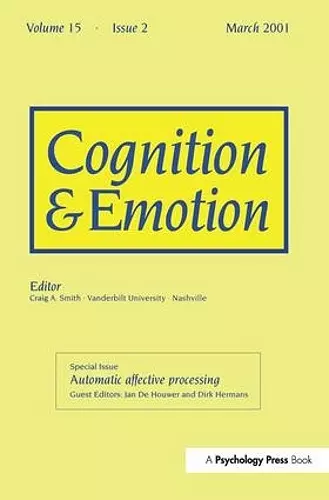Automatic Affective Processing
A Special Issue of Cognition and Emotion
Jan De Houwer editor Dirk Hermans editor
Format:Paperback
Publisher:Taylor & Francis Ltd
Published:8th Feb '01
Currently unavailable, and unfortunately no date known when it will be back

The concepts 'affect', 'valence' and 'attitude' are all fundamentally linked to the basic psychological dimension of good vs bad, positive vs negative, approach vs avoid. Affective processing refers to the act of determining the location of a stimulus on the affective dimension. Over the past few decades, scholars of emotion theory, social psychology, and learning psychology have put forward the hypothesis that affective processing does not depend on controlled cognitive processing. That is, they propose that organisms are able to determine whether a stimulus is good or bad without engaging in intentional, goal-directed, conscious, or capacity-demanding processing of the (evaluative attributes of the) stimulus. Rather, affective processing could occur automatically. Such automatic affective processing was believed to have an important impact on subsequent cognitive processing and behaviour. These proposals led to a multitude of research. New paradigms were developed that allow one to study the conditions under which stimulus valence can be processed and efforts were directed at understanding how such affective processing influences subsequent cognitive processing and behaviour. The aim of this special issue is to provide an overview of some of (a) the paradigms that are available to study automatic affective processing, (b) the knowledge about affective processing that has been gained over the last years, and (c) the issues and questions that are currently being addressed and that will most likely dominate the research in years to come.
ISBN: 9780863776465
Dimensions: unknown
Weight: 260g
138 pages